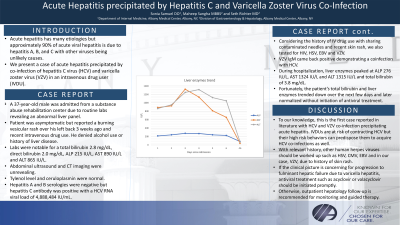Tuesday Poster Session
Category: Liver
P3875 - Acute Hepatitis Precipitated by Hepatitis C and Varicella Zoster Virus Co-Infection
Tuesday, October 24, 2023
10:30 AM - 4:00 PM PT
Location: Exhibit Hall

Has Audio

Sonia Samuel, DO
Albany Medical Center
Albany, NY
Presenting Author(s)
Sonia Samuel, DO, Maheep Sangha, MBBS, Seth Richter, MD
Albany Medical Center, Albany, NY
Introduction: Acute hepatitis has many etiologies but approximately 90% of acute viral hepatitis is due to hepatitis A, B, and C with other viruses being unlikely causes. We present a case of acute hepatitis precipitated by co-infection of hepatitis C virus (HCV) and varicella zoster virus (VZV) in an intravenous drug user (IVDU).
Case Description/Methods: A 37-year-old male was admitted from a substance abuse rehabilitation center due to routine labs revealing an abnormal liver panel. Patient was asymptomatic but reported a burning vesicular rash over his left back 3 weeks ago and recent intravenous drug use. He denied alcohol use or history of liver disease. Labs were notable for a total bilirubin 2.8 mg/dL, direct bilirubin 2.0 mg/dL, alkaline phosphatase (ALP) 215 IU/L, aspartate aminotransferase (AST) 890 IU/L and alanine aminotransferase (ALT) 865 IU/L. Abdominal ultrasound and CT imaging were unrevealing. Tylenol level and ceruloplasmin were normal. Hepatitis A and B serologies were negative but hepatitis C antibody was positive with a HCV RNA viral load of 4,888,484 IU/mL. Considering the history of IV drug use with sharing contaminated needles and recent skin rash, we also tested for human immunodeficiency virus (HIV), herpes simplex virus (HSV), Epstein-Barr virus (EBV) and VZV. VZV IgM came back positive demonstrating a co-infection with HCV. During hospitalization, liver enzymes peaked at ALP 276 IU/L, AST 1324 IU/L and ALT 1315 IU/L and total bilirubin of 3.8 mg/dL. Fortunately, the patient’s total bilirubin and liver enzymes trended down over the next few days and later normalized without initiation of antiviral treatment (Figure A).
Discussion: To our knowledge, this is the first case reported in literature with HCV and VZV co-infection precipitating acute hepatitis. IVDUs are at risk of contracting HCV but their high risk behaviors can predispose them to acquire HCV co-infections as well. With relevant history, other human herpes viruses should be worked up such as HSV, CMV, EBV and in our case, VZV, due to history of skin rash. If the clinical picture is concerning for progression to fulminant hepatic failure due to varicella hepatitis, antiviral treatment such as acyclovir or valacyclovir should be initiated promptly. Otherwise, outpatient hepatology follow-up is recommended for monitoring and guided therapy.

Disclosures:
Sonia Samuel, DO, Maheep Sangha, MBBS, Seth Richter, MD. P3875 - Acute Hepatitis Precipitated by Hepatitis C and Varicella Zoster Virus Co-Infection, ACG 2023 Annual Scientific Meeting Abstracts. Vancouver, BC, Canada: American College of Gastroenterology.
Albany Medical Center, Albany, NY
Introduction: Acute hepatitis has many etiologies but approximately 90% of acute viral hepatitis is due to hepatitis A, B, and C with other viruses being unlikely causes. We present a case of acute hepatitis precipitated by co-infection of hepatitis C virus (HCV) and varicella zoster virus (VZV) in an intravenous drug user (IVDU).
Case Description/Methods: A 37-year-old male was admitted from a substance abuse rehabilitation center due to routine labs revealing an abnormal liver panel. Patient was asymptomatic but reported a burning vesicular rash over his left back 3 weeks ago and recent intravenous drug use. He denied alcohol use or history of liver disease. Labs were notable for a total bilirubin 2.8 mg/dL, direct bilirubin 2.0 mg/dL, alkaline phosphatase (ALP) 215 IU/L, aspartate aminotransferase (AST) 890 IU/L and alanine aminotransferase (ALT) 865 IU/L. Abdominal ultrasound and CT imaging were unrevealing. Tylenol level and ceruloplasmin were normal. Hepatitis A and B serologies were negative but hepatitis C antibody was positive with a HCV RNA viral load of 4,888,484 IU/mL. Considering the history of IV drug use with sharing contaminated needles and recent skin rash, we also tested for human immunodeficiency virus (HIV), herpes simplex virus (HSV), Epstein-Barr virus (EBV) and VZV. VZV IgM came back positive demonstrating a co-infection with HCV. During hospitalization, liver enzymes peaked at ALP 276 IU/L, AST 1324 IU/L and ALT 1315 IU/L and total bilirubin of 3.8 mg/dL. Fortunately, the patient’s total bilirubin and liver enzymes trended down over the next few days and later normalized without initiation of antiviral treatment (Figure A).
Discussion: To our knowledge, this is the first case reported in literature with HCV and VZV co-infection precipitating acute hepatitis. IVDUs are at risk of contracting HCV but their high risk behaviors can predispose them to acquire HCV co-infections as well. With relevant history, other human herpes viruses should be worked up such as HSV, CMV, EBV and in our case, VZV, due to history of skin rash. If the clinical picture is concerning for progression to fulminant hepatic failure due to varicella hepatitis, antiviral treatment such as acyclovir or valacyclovir should be initiated promptly. Otherwise, outpatient hepatology follow-up is recommended for monitoring and guided therapy.

Figure: Liver enzyme trends from HCV and VZV co-infection during patient hospitalization and follow-up
Disclosures:
Sonia Samuel indicated no relevant financial relationships.
Maheep Sangha indicated no relevant financial relationships.
Seth Richter indicated no relevant financial relationships.
Sonia Samuel, DO, Maheep Sangha, MBBS, Seth Richter, MD. P3875 - Acute Hepatitis Precipitated by Hepatitis C and Varicella Zoster Virus Co-Infection, ACG 2023 Annual Scientific Meeting Abstracts. Vancouver, BC, Canada: American College of Gastroenterology.
